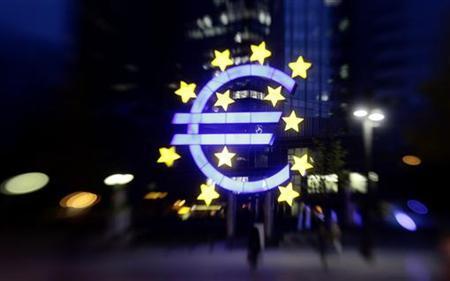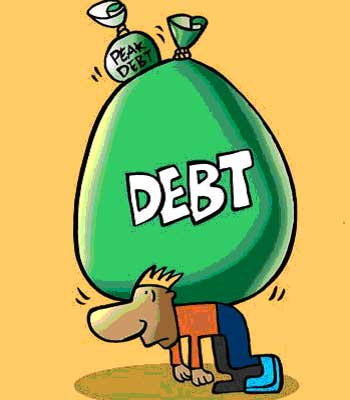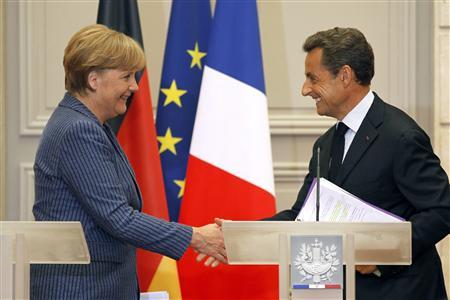Photographs: Reuters Shonalee Biswas
The roommate was in the questioning mode again. "So what is the basic problem with the world today?" she asked, expecting me to know the answer.
"Oh my, we are getting philosophical again," I replied. "The basic problem with the world today is that you don't cook as often as you should and I have to end up cooking on most days."
"Whenever I ask you a serious question, you take it as a joke," she sulked.
"Ha, ha. You still haven't learnt to take a joke!"
"Yeah, I haven't," he said. "So now answer my question."
"The basic problem with the world today is excess debt. In a recent research paper, The real effects of debt, Stephen G Cecchetti, M S Mohanty and Fabrizio Zampolli deal with this issue in great detail. They find out that the debt levels in 18 countries which are the members of Organisation for Economic Co-operation and Development (OECD) have gone up from 167 per cent of gross domestic product (GDP) way back in 1980 to 314 per cent of GDP now."
"What is OECD?"
. . .
Debt crisis: Will a political UNION rescue Europe?
Photographs: Reuters
"OECD is group of some of the most economically developed countries in the world like the United States, the United Kingdom, Japan, Canada, and almost all the big countries that use Euro as their currency," I answered.
"And what does this debt consist of?"
"This debt is basically a sum of government debt, corporate debt and household debt. The authors say that some amount of debt initially is good for growth, but once it starts to go beyond a certain limit it acts as a drag on economic growth. In the case of government debt, this limit is reached when it crosses a level of 85 per cent of that nation's GDP."
"So how can this be addressed?" she asked.
"I don't know if what I have is an answer, but yes I do have some views on the issue. And let's discuss this in the context of Europe given that it is in the new right now."
"Sure."
. . .
Debt crisis: Will a political UNION rescue Europe?
Photographs: Reuters
"Countries like Greece, Italy, Spain, Portugal, Ireland etc, are in big trouble. The rescue effort in Europe is being led by Germany and France. To that affect Chancellor Angela Merkel of Germany and President Nicolas Sarkozy of France keep meeting regularly. And their solution for the countries in trouble seems to be less expenditure, more taxes and fewer people working for the government. In fact new governments in Italy, Spain and Greece are following these measures."
"And this is not working?" she interrupted.
"It clearly is not. As an investment-letter writer Gary Dorsch recently wrote: 'In 2010, Greece's economic output fell by -4.5 per cent and roughly 65,000 private companies declared bankruptcy. More than 200,000 people lost their jobs. The situation has gotten much worse this year. Greece's jobless rate hit a record high of 18.4 per cent in August. The jobless rate for workers in the 15-24-year category reached 43.5 per cent, twice its level three years ago, and is a tinderbox that could explode at any moment'."
. . .
Debt crisis: Will a political UNION rescue Europe?
Photographs: Uttam Ghosh/Rediff.com
"Why is that happening?"
"For the simple reason that the environment is bad for the private sector. And on top of that the government expenditure is being cut and taxes being raised, which means that citizens will earn lesser and consequently spend lesser money as well. This, in turn, has a negative impact on economic growth. Greece's economy is shrinking, at an annual pace of 5.5 per cent. So a shrinking economy, in turn, means fewer jobs, which in turns again means lesser money and hence lesser spending. So works the cycle."
"What about the other countries?"
"As Dorsh points out: 'Italy and Spain are trying to pare down their running debt balances through painful austerity measures, but the results are record high unemployment of 21.5 per cent in Spain, and a sharp plunge in Italy's industrial output'."
"So what is the way out?" she asked.
. . .
Debt crisis: Will a political UNION rescue Europe?
Photographs: Reuters
"Well, in the normal scenario the government could have borrowed more and hoped to spend that money to create jobs and hence drive the economy out of trouble. But that is not possible given the high level of government debt in these countries. As Cecchetti, Mohanty and Zampolli point out: 'The capacity of the public sector to borrow is not unlimited. When a crisis strikes, the ability of the government to intervene depends on the amount of debt that it has already accumulated as well as what its creditors perceive to be its fiscal capacity that is, the capacity to raise tax revenues to service and repay the debt'."
"Fair point," she commented.
"Yeah. And most of these countries that are in trouble are in a big mess already. So their ability to borrow is very limited. In some cases it is almost not there. Like if Greece were to try and borrow money right now for a two-year period, it will have to pay an interest of a whopping 152 per cent per year."
. . .
Debt crisis: Will a political UNION rescue Europe?
Image: German Chancellor Angela Merkel with French President Nicolas Sarkozy.Photographs: Reuters
"That is scary."
"Yes, it is. And if all this wasn't enough news reports seem to suggest that Merkel and Sarkozy are now in the process of proposing a political union in Europe. Countries which wanted to have Euro as their currency needed to maintain a fiscal deficit which did not exceed 3 per cent of their GDP. Fiscal deficit is the difference between what a government earns and what a government spends. At the same time the government debt at any point of time could not have exceeded 60 per cent of their GDP. Of course, this condition currently is not followed by any of the countries using Euro as their currency."
"So what is being proposed now?"
"Merkel and Sarkozy now want legally enforceable rules. So whenever a country breaches these rules it would be faced with sanctions. Practically this means that the ability of countries to decide on their budgets would end and would pass onto the European Central Bank based in Brussel," I explained.
. . .
Debt crisis: Will a political UNION rescue Europe?
Photographs: Reuters
"Do you see that happening?"
"Seems very difficult. Any such change would require the approval of all countries that use the euro as their currency. It would also require a change in their respective constitutions. As hedge fund manager John Mauldin put it in a recent column: 'Will even German voters give up their independence and listen to an European Union commission telling them what they can and cannot do with their own budget?'"
"So do you see these countries giving away their freedom?"
"Seems difficult. But the other option is to opt out of the Euro and that, as we have discussed, is much worse."
"Yeah. We do live in interesting times."
The author can be reached at shonalee.biswas@rediffmail.com








article